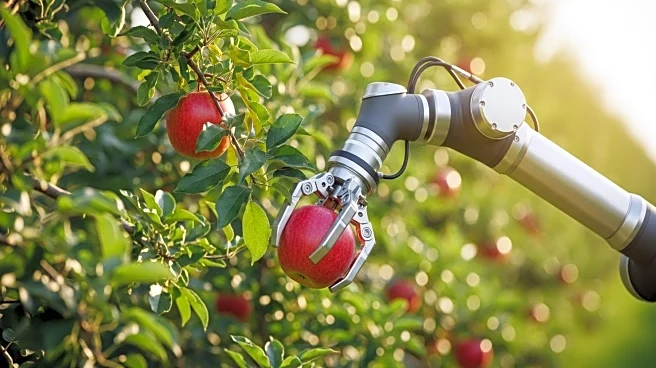What's Happening?
The University of California's Agriculture and Natural Resources arm has announced the 2026 Farm Robotics Challenge, aimed at advancing agricultural technology and innovation. This initiative is part of a broader trend in the agrifood tech sector, which includes significant funding and mergers and acquisitions. Notably, Keurig Dr. Pepper has acquired Peet's Coffee, and Maalexi, an agriculture-focused fintech startup, has secured a $20 million shariah-compliant facility to expand operations in the UAE and Saudi Arabia. Additionally, Vox AI has raised $8.7 million to enhance voice AI technology in restaurant drive-thrus. These developments highlight the growing interest and investment in agricultural technology and sustainable practices.
Why It's Important?
The 2026 Farm Robotics Challenge represents a significant step towards integrating advanced technology into agriculture, potentially transforming farming practices and increasing efficiency. This initiative could lead to the development of new robotic solutions that address labor shortages and improve crop management. The acquisition of Peet's Coffee by Keurig Dr. Pepper and the funding secured by Maalexi and Vox AI indicate a strong market interest in agrifood tech, which could drive further innovation and investment in the sector. These advancements may benefit farmers by providing new tools and technologies to enhance productivity and sustainability.
What's Next?
As the 2026 Farm Robotics Challenge progresses, stakeholders in the agricultural sector, including farmers, tech companies, and investors, will likely monitor developments closely. The challenge may inspire further collaborations and partnerships aimed at developing cutting-edge agricultural technologies. Additionally, the recent mergers and funding rounds could lead to increased competition and innovation in the agrifood tech industry, potentially resulting in new products and services that benefit both producers and consumers.
Beyond the Headlines
The focus on robotics and AI in agriculture raises important ethical and practical considerations, such as the impact on employment and the need for training and education in new technologies. As these technologies become more prevalent, there may be discussions around data privacy, security, and the role of AI in decision-making processes within the agricultural sector.









